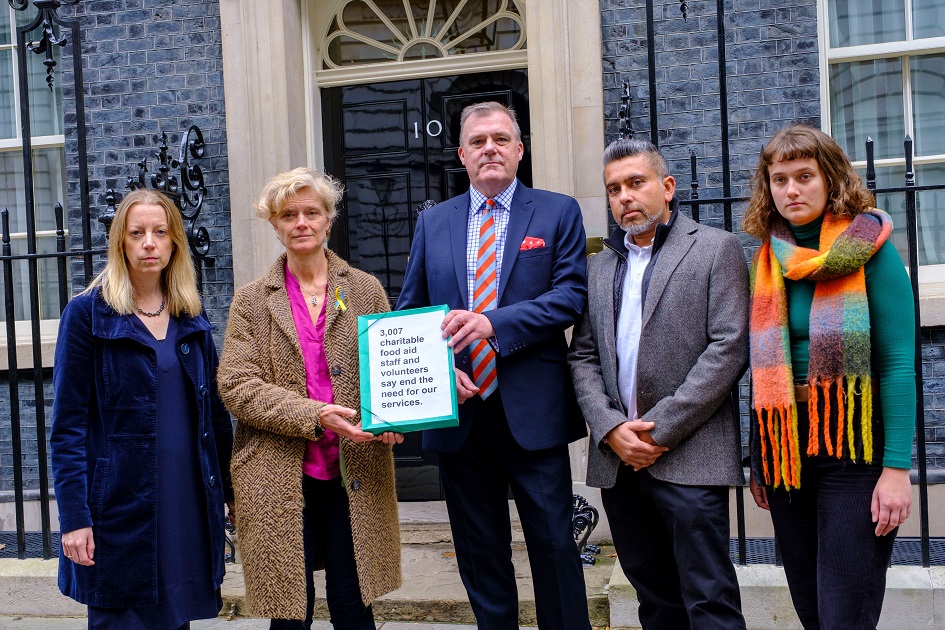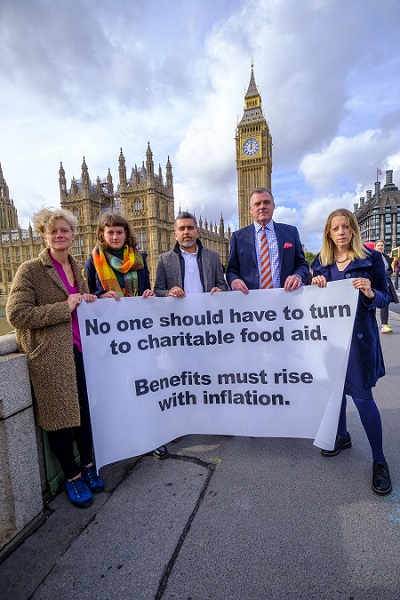
Today a letter signed by more than 3,000 food bank staff and volunteers was handed in to Downing Street, calling on Liz Truss to take urgent action to end the need for emergency food.
Standing together, we’ve worked alongside the Independent Food Aid Network and Feeding Britain to collectively call on the Prime Minister to use her powers to ensure everyone has enough income to afford life’s essentials.
Steph Maxwell, Uttlesford Food Bank Coordinator said:
“The impact of the cost of living crisis is being most keenly felt by people on the lowest incomes, forced to live from day to day, never having sufficient funds to bulk buy or take advantage of discounts. It costs more to be poor. As well as skipping meals, not switching the heating on, not buying school uniforms to replace outgrown ones, many families have no option but to turn to a charity to make ends meet.
“It cannot be right that the poorest people in our society are being pushed deeper into poverty because of an inadequate social security system that does not reflect the true cost of living.
“Our food bank continues to be busier year on year, and unless benefits are kept in line with the true cost of living, we anticipate a sharp increase over the coming months. I hope Liz Truss will show some compassion and ensure that the benefits system is sufficient for people to buy their essentials and to live with dignity.”
Thousands of members of the public stand with our food banks

Today’s hand-in is also supported by a groundswell of 3902 people who have written to their MP, calling on them to go further to help people on the lowest incomes in their community.
This comes off the back of the Trussell Trust’s latest research which found that millions of people in receipt of Universal Credit experienced severe financial hardship this summer due to the rising cost of living. Two in five (40%) have needed to skip meals to keep up with other essential living costs. Twenty-one percent have been unable to cook hot food because they couldn’t afford to use the oven or other utilities. And the situation will get worse as the weather turns colder and people need to use more energy to heat and light their homes.
Today demonstrates that more and more people agree that food banks are not the solution to financial hardship. The government should ensure benefit rates will always be enough to protect people from destitution, which means ensuring people can afford the essentials we all need to eat, stay warm and dry. For a start, this means the government should keep its commitment to raise benefits in line with at least the September rate of inflation.
Flora Schweighofer, Southwark Food Bank Community Engagement Officer, said:
“I’m part of the hand-in at Downing Street today because it is vital to create change. I am worried that more and more people will not be able to afford the essentials, and therefore need to use a food bank or other form of charitable food aid for the first time. But I am especially concerned about the situation facing people who are already struggling, whose income did not reach far enough, even before this dramatic rise in the cost of everyday life. I am worried about how this will affect the mental and physical health of many people in our community.”


